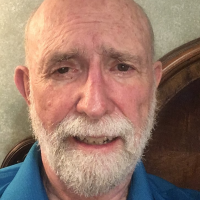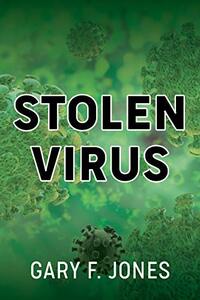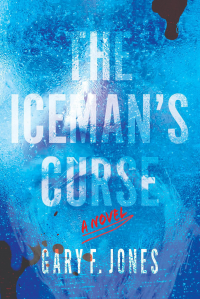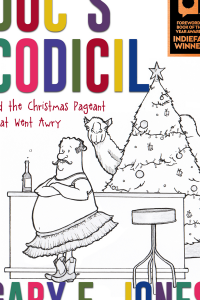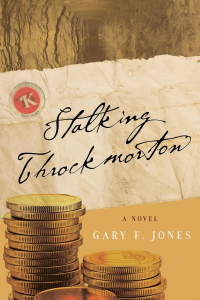Gary F. Jones Interview Published on: 01, Mar 2023
 Which is your most cherished childhood memory?
Which is your most cherished childhood memory?
Childhood, for me, was a long time ago.
Thanksgiving and Christmas dinners with our extended family would top the list.
What childhood habits can you never get rid of?Childhood habits? Ouch. There are a few I’m afraid, but none I’d like to publicize.
If you could build a library for your kids, what books would you include and why?My youngest child is 39. The library is already available among the many books on my shelves, and they’ve shown no interest in them.
In non-fiction, I’m fond of history and biology. My favorite non-fiction books include Steven Pinker’s The Blank Slate: The Modern Denial of Human Nature and How The Mind Works. Robert Sapolsky’s Behave: The Biology Of Humans At Our Best And Worst is one of my favorites. Stephen J. Gould was an author I routinely looked for. The book of his that I’d definitely include is Wonderful Life: The Burgess Shale and the Nature of History. Barbara Tuchman’s The Guns of August, The Proud Tower, and The March of Folly are among my favorites, although I found it difficult to read her chapters on the Vietnam war. I didn’t serve in the military, but the arguments about the war at the time were wrenching. Every thinking person should read The Lucifer Effect; Understanding How Good People Turn Evil, by Philip Zimbardo, to see how easy it is to become cruel.
In fiction, I don’t think you can do better than Sarah’s Key by Tatiana De Rosnay. My other fiction favorites lean toward histories or mysteries, all with humor. At the head of the list is the old Flashman series (Flashman, Royal Flash, Flashman’s Lady, Flash for Freedom! and others) by George McDonald Fraser, followed closely by anything written by Carl Hiaasen.
Did you always want to write mysteries, or did another genre call to you first?My first book (Doc’s Codicil) began with a compilation of 30 years’ worth of humorous Christmas letters about my family. Thirty pages doesn’t make a book, so I added stories about my family and large animal veterinary practice. It was a book looking for a genre. I turned it into something of a mystery by starting with the reading of my protagonist’s will. He insisted that his heirs take Doofus squirrel fishing, and no one knew what on Earth that referred to. The book won a national award for humor.
Does first person point of view read smoother than third person? Which one do you prefer?Well-handled, both can read smoothly, although it takes me a while to get used to first person. I prefer writing in 3rd person.
What is your opinion of using a grammar program like Grammarly when it comes to writing fiction?It can help, and I use it. There are other programs I’ve used to keep use of certain words (i.e. then, just, really, starting, beginning) to a minimum.
How important is a first draft for a novel?For me, the first draft is like the first step in a trip of a thousand miles. It’s a start, and it sets me on the road. That’s a nice way of saying it gets my butt in gear. For some of my books, you wouldn’t think the final version was related to the first draft.
When and how did you know that the first draft of your novel, The Iceman's Curse is good?The first draft wasn’t good. On what must have been my tenth version, an agent insisted I drop the first chapter entirely and rewrite the next two chapters. The novel seemed to gel after that.
How is veterinary practice on endangered animals different from veterinary practice on non-endangered animals?Once a zoo thankfully decided not to consider more X-rays and surgery for a lame grizzly bear I was helping with. I’d come close to being grizzly burgers while getting the first X-rays, and I was greatly relieved not to take it further. We settled for putting him on a sort of super aspirin.
I’ve never worked with an endangered species unless a 6-month-old kitten counts. It was a Bengal Tiger but had nothing seriously wrong with it. I suspect that each animal of reproductive age would have more value than would be true of non-endangered species.
How did you begin writing "Stalking Throckmorton", the first book in The Throckmorton series?My mother’s family owned a brewery in a small town between 1854 and 1920. It then became a canning factory, but that went broke after my grandfather died in 1935. There was a cavern under the brewery, necessary for brewing lager beer prior to refrigeration, and tunnels under the town to all the bars allowed delivery of beer by pony cart during snowstorms. The brewery wasn’t demolished until 2014. It was the biggest building in town as I grew up. The tunnels beneath the town are thought to still be open. That was just begging for a mystery about a family fortune hidden in one of the tunnels and a killer watching the protagonist as he searched for it.
Which are the most humorous, cozy mystery books that one must read?Those by Carl Hiaasen are my favorites, though I don’t think you’d call them cozy mysteries. I read one or two books a week, and I often don’t remember the titles and names of authors (I’m ADD, and worse, I had a large hematoma on the left side of my brain last spring. That really messed with my memory.)
How many rounds of editing do books go through until the author gets a final draft that is ready for publishing?Some wits claim I haven’t done that yet. I suspect this will vary with the author and their experience. I heard an author complain that she rewrote her first book 42 times, and only one sentence made it from the first draft to the finished work. But her agents managed to sell her book to a major publishing house, so it was worth it.
I don’t think I’ve rewritten a whole book that often, but I’ve rewritten some portions of my books well over 20 times, and I’m sure I’ve rewritten all my books at least ten times before submission and several times after that at the request of my publisher’s editors.
When you're not reading or writing a book, what are some other things that you love to do?I learned to cook, from Chinese stir-fries to French entrees and Austrian desserts. Obviously, I enjoy eating even more than cooking. My wine collection is something over 150 bottles of reds and quite a few white wines. It gives me something to drink with my cooking.
I’m also a docent at a local zoo one day a week. I enjoy talking to people and explaining unusual aspects of the animals they are observing. With skeletons as props, I give a two-minute spiel on why we can walk and run upright, but other primates have a hard time with that. The neck (cervical) vertebrae of an old giraffe are also available. All mammals have only seven vertebrae in their neck, so if you have a six-foot neck, those bones are impressive.
Is there anything you are currently working on that may intrigue the interest of your readers?I’m revising the second book in what I hope will be the Throckmorton series, and I’m preparing a 40-page summary of Ed Yong’s An Immense World: How Animal Senses Reveal the Hidden Realms Around Us for use by other docents. Each animal senses their world uniquely, and we often struggle to understand their behavior unless we understand how they sense their world, their umwelt.
How has your experience of being associated with AllAuthor been?It has been an easy and pleasant way to frequently put interesting descriptions and photos of my books in front of the reading public.
Share Gary F. Jones's interview
Gary F. Jones retired in 2012 and made a remarkable debut in the writing world with his book, Doc's Codicil. He has worked in large animal veterinary practices and in the research and development of bovine and swine vaccines. He learned to cook, from Chinese stir-fries to French entrees and Austrian desserts. He is fond of history and biology.
